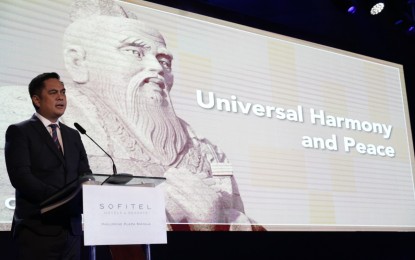
MANILA — The Philippines’ participation in China’s ambitious Belt and Road Initiative (BRI) will boost local productivity, trade relations, services, businesses, and cultural exchanges with other countries, Presidential Communications Operations Office (PCOO) Secretary Martin Andanar said on Friday.
He added that the BRI also provides a catalyst for peace and harmony among nations.
Speaking at Belt and Road China-Philippines Forum on People-to-People Exchange & Economic Cooperation, Andanar noted how China connected continents with about 152 countries by reviving the ancient silk road through modern infrastructure under its BRI.
“The idea behind this initiative, as presented to over a hundred countries that agreed to participate, is to encourage each country to be internally productive. to trade goods, services, and technology, to do progressive business with all nations, and to strengthen people-to-people cultural exchanges, for the best possible understanding and unity of diverse societies,” he said in his speech.
Andanar said nation-building comes with constructing physical infrastructure—a cornerstone policy of President Rodrigo Duterte through the “Build, Build, Build” program that would boost economic activity, generate jobs, give Filipinos a comfortable life, and ultimately mitigate poverty.
“The People’s Republic of China has responded investing in our President’s massive infrastructure program known as the ‘Build, Build, Build.’ This was mainly due to our President’s foreign policy initiative of personal diplomacy,” Andanar said, noting how both countries’ infrastructure push converge with one another.
Andanar said the PCOO has actively been participating in media exchanges, noting the various memoranda of understanding the Philippines signed with the China Central Television Network.
With continuous audio-visual links, exchange visits among each other’s staff, regular sharing of programs, and other cooperative ventures underway, Andanar underscored that the expansion of a platform for opinion-sharing was an indication that the PCOO values the healthy exchange of intellectual dialogue and culture appreciation.
“Ultimately, we all need mutual understanding for mutual tolerance,” Andanar said.
“Through communication and the dissemination of the truthful information, we can ensure harmony and peace in our time. Despite our differing cultures, our most important property is, and will always be, the commonality of our being human,” he said, expressing optimism to see countries on the “express train” of the new Silk Route.
In a chance interview after his speech, Andanar highlighted how big the Philippines’ role is in the BRI, noting that it is the country coordinator in ASEAN-China relations.
“We all want to move forward in our communications having good cooperation between our countries, ASEAN, and China. China is the number two economy in the world, we are right smack at the middle of the trading route between China and the rest of the world, to the West Philippine Sea, or South China Sea. So the Philippines is indispensable in the importance of the Belt and Road Initiative,” Andanar said in a mix of Filipino and English.
Aside from physical connectivity, Andanar said the trade routes have proven to become the “routes of dialogue among people.”
“The language of merchants become inadvertently the language of communication. Cargoes and wares carry the contents and cultures of the people who made them. The wonders of different civilizations are acquired through markets and bazaars,” Andanar said.
“All of these mercantile practices are essential fundamental data of our work in the information and media industries,” he said.
In a think tank and media dialogue sub-forum, News and Information Bureau and Philippine News Agency head, Director Virginia Arcilla-Agtay highlighted that media plays a pivotal role in strengthening partnerships between states.
“Its main purpose, which is to inform and connect people with current affairs, promotes better understanding between states and their citizens. It is in this manner that Philippine and Chinese media can work together to promote mutual understanding. We can keep each other up to date regarding relevant current events, dispel further misunderstandings in areas of conflict, foster media transparency between each other, and in turn build trust and open doors for cooperation,” she said.
“With so much happening in our surroundings, it is best if the public is always kept informed of all the sides to each story—including its cultural and country-specific roots. In this manner, we will be able to foster a greater understanding not only between the Philippines and China but also with our future partners. Hence, we must work towards a vision where our countries will freely converse and support each other because trust has already been built and is continually being strengthened by media cooperation,” she added.
For the latest updates about this story, visit the Philippine News Agency website
